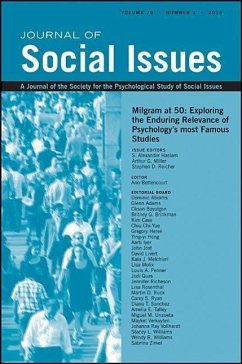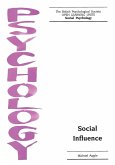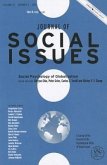Milgram at 50
Exploring the Enduring Relevance of Psychology's Most Famous Studies
Herausgeber: Haslam, S Alexander; Bettencourt, Ann; Reicher, Stephen; Miller, Arthur G
Milgram at 50
Exploring the Enduring Relevance of Psychology's Most Famous Studies
Herausgeber: Haslam, S Alexander; Bettencourt, Ann; Reicher, Stephen; Miller, Arthur G
- Broschiertes Buch
- Merkliste
- Auf die Merkliste
- Bewerten Bewerten
- Teilen
- Produkt teilen
- Produkterinnerung
- Produkterinnerung
To mark the 50th anniversary of Milgram's first major publication--"Behavioral study of obedience" (1963)--this issue contains fourteen papers from eading Milgram scholars examining the contemporary relevance of the famous Yale studies. The issue offers a critical appraisal of the impact of Milgram's work, as well as its moral dangers and analytic weaknesses. Several important new perspectives obtained from archival analysis and innovative methodologies are also presented. The relevance of Milgram's experiments for an understanding of the Holocaust is given particular emphasis. The issue…mehr
Andere Kunden interessierten sich auch für
![Remembering: What 50 Years of Research with Famous Amnesia Patient H.M. Can Teach Us about Memory and How It Works Remembering: What 50 Years of Research with Famous Amnesia Patient H.M. Can Teach Us about Memory and How It Works]() Donald G. MacKayRemembering: What 50 Years of Research with Famous Amnesia Patient H.M. Can Teach Us about Memory and How It Works22,99 €
Donald G. MacKayRemembering: What 50 Years of Research with Famous Amnesia Patient H.M. Can Teach Us about Memory and How It Works22,99 €![Nebraska Symposium on Motivation, Volume 50 Nebraska Symposium on Motivation, Volume 50]() Nebraska SymposiumNebraska Symposium on Motivation, Volume 5055,99 €
Nebraska SymposiumNebraska Symposium on Motivation, Volume 5055,99 €![Social Exclusion of Children Social Exclusion of Children]() Social Exclusion of Children45,99 €
Social Exclusion of Children45,99 €![Identity in Modern Society Identity in Modern Society]() Bernd SimonIdentity in Modern Society68,99 €
Bernd SimonIdentity in Modern Society68,99 €![Social Influence Social Influence]() Michael ArgyleSocial Influence36,99 €
Michael ArgyleSocial Influence36,99 €![Social Relationships Social Relationships]() Michael ArgyleSocial Relationships39,99 €
Michael ArgyleSocial Relationships39,99 €![Social Psychology of Globalization Social Psychology of Globalization]() Social Psychology of Globalization52,99 €
Social Psychology of Globalization52,99 €-
-
-
To mark the 50th anniversary of Milgram's first major publication--"Behavioral study of obedience" (1963)--this issue contains fourteen papers from eading Milgram scholars examining the contemporary relevance of the famous Yale studies. The issue offers a critical appraisal of the impact of Milgram's work, as well as its moral dangers and analytic weaknesses. Several important new perspectives obtained from archival analysis and innovative methodologies are also presented. The relevance of Milgram's experiments for an understanding of the Holocaust is given particular emphasis. The issue presents a range of fresh material that provides the basis for a significant updating of our appreciation of Milgram's legacy, and that will inform forthcoming scholarship and debate.
Hinweis: Dieser Artikel kann nur an eine deutsche Lieferadresse ausgeliefert werden.
Hinweis: Dieser Artikel kann nur an eine deutsche Lieferadresse ausgeliefert werden.
Produktdetails
- Produktdetails
- Verlag: Wiley
- Seitenzahl: 210
- Erscheinungstermin: 29. September 2014
- Englisch
- Abmessung: 226mm x 150mm x 13mm
- Gewicht: 272g
- ISBN-13: 9781119029021
- ISBN-10: 1119029023
- Artikelnr.: 41415666
- Herstellerkennzeichnung
- Libri GmbH
- Europaallee 1
- 36244 Bad Hersfeld
- gpsr@libri.de
- Verlag: Wiley
- Seitenzahl: 210
- Erscheinungstermin: 29. September 2014
- Englisch
- Abmessung: 226mm x 150mm x 13mm
- Gewicht: 272g
- ISBN-13: 9781119029021
- ISBN-10: 1119029023
- Artikelnr.: 41415666
- Herstellerkennzeichnung
- Libri GmbH
- Europaallee 1
- 36244 Bad Hersfeld
- gpsr@libri.de
S. Alexander Haslam is Professor of Social and Organizational Psychology and Australian Laureate Fellow at the University of Queensland. He is a former Chief Editor of the European Journal of Social Psychology (2002-2005) and his work focuses on the study of group and identity processes in social and organizational contexts. With colleagues he has written and edited 11 books, the most recent being The New Psychology of Leadership: Identity, Influence and Power (with Steve Reicher & Michael Platow, Psychology Press, 2011) and Social Psychology: Revisiting the Classic Studies (edited with Joanne Smith, Sage, 2012). Arthur G. Miller is Professor Emeritus of Psychology at Miami University in Oxford, Ohio. He received his doctorate in social psychology from Indiana University in 1967, and spent 1979-1980 at Princeton University on anNIMH fellowship, studying with Ned Jones. He is the author of The Obedience Experiments: A Case Study of Controversy in Social Science (Praeger, 1986). He edited a special issue of Personality and Social Psychology Review ("Harming other people: Perspectives on evil and violence," 1999, 3), and The Social Psychology of Good and Evil (Guilford, 2004). The second edition of the latter is in progress.?He was one of the commentators on Burger's modification of the obedience paradigm, featured in a special issue of the American Psychologist (January, 2009), and a commentator on Diana Baumrind's reprise of her classic ethical critique of Milgram's first obedience article in Theoretical and Applied Ethics (2014). Stephen Reicher is Professor of Psychology at the University of St. Andrews. A former editor of the British Journal of Social Psychology, his work centres of the relationship between social identity and collective behaviour. In over 200 publications he has addressed such topics as crowd psychology, intergroup hostility, nationalism and national identity, political rhetoric, leadership and the psychology of tyranny and resistance. His latest two books are The New Psychology of Leadership: Identity, Influence and Power (with Alex Haslam and Michael Platow, Psychology Press, 2011) and Mad Mobs and Englishmen? Myths and Realities of the 2011 Riots (with Clifford Stott, Constable, 2011).
INTRODUCTION
What Makes a Person a Perpetrator? The Intellectual, Moral, and
Methodological Arguments for Revisiting Milgram's Research on the Influence
of Authority 393
Stephen D. Reicher, S. Alexander Haslam, and Arthur G. Miller
SECTION I: THE GAPS IN MILGRAM'S ANALYSIS: NEW INSIGHTS FROM THE MILGRAM
ARCHIVES
The Emergence of Milgram's Bureaucratic Machine 409
Nestar Russell
Discourse, Defiance, and Rationality: "Knowledge Work" in the "Obedience"
Experiments 424
Stephen Gibson
Revisioning Obedience: Exploring the Role of Milgram's Skills as a
Filmmaker in Bringing His Shocking Narrative to Life 439
Kathryn Millard
SECTION II: THE RICHNESS OF MILGRAM'S FINDINGS: INSIGHTS FROM EMPIRICAL AND
CONCEPTUAL EXTENSIONS
Milgram's Unpublished Obedience Variation and its Historical Relevance 454
Francois Rochat and Thomas Blass
Nothing by Mere Authority: Evidence that in an Experimental Analogue of the
Milgram Paradigm Participants are Motivated not by Orders but by Appeals to
Science 471
S. Alexander Haslam, Stephen D. Reicher, and Megan E. Birney
Beyond Obedience: Situational Features in Milgram's Experiment That Kept
His Participants
Shocking 487
Jerry M. Burger
SECTION III: THE SIGNIFICANCE OF MILGRAM'S EXPERIMENTS: OBEDIENCE,
DESTRUCTIVENESS, AND RESISTANCE
Obeying, Joining, Following, Resisting, and Other Processes in the Milgram
Studies, and in the Holocaust and Other Genocides: Situations, Personality,
and Bystanders 499
Ervin Staub
"Ordinary Men," Extraordinary Circumstances: Historians, Social Psychology,
and the Holocaust 513
Richard Overy
Authorities and Uncertainties: Applying Lessons from the Study of Jewish
Resistance during the Holocaust to the Milgram Legacy 529
Rachel L. Einwohner
SECTION IV: THE MEANING OF MILGRAM'S EXPERIMENTS: CAUSALITY,
RESPONSIBILITY, AND CONTEXT
Observing Obedience: How Sophisticated are Social Perceivers? 542
Andrew E. Monroe and Glenn D. Reeder
The Explanatory Value of Milgram's Obedience Experiments: A Contemporary
Appraisal 556
Arthur G. Miller
Obedience, Self-Control, and the Voice of Culture 572
Michael R. Ent and Roy F. Baumeister
SECTION V: OVERVIEW AND COMMENTARY
50:50 Hindsight: Appreciating Anew the contributions of Milgram's Obedience
Experiments 585
Jolanda Jetten and Frank Mols
What Makes a Person a Perpetrator? The Intellectual, Moral, and
Methodological Arguments for Revisiting Milgram's Research on the Influence
of Authority 393
Stephen D. Reicher, S. Alexander Haslam, and Arthur G. Miller
SECTION I: THE GAPS IN MILGRAM'S ANALYSIS: NEW INSIGHTS FROM THE MILGRAM
ARCHIVES
The Emergence of Milgram's Bureaucratic Machine 409
Nestar Russell
Discourse, Defiance, and Rationality: "Knowledge Work" in the "Obedience"
Experiments 424
Stephen Gibson
Revisioning Obedience: Exploring the Role of Milgram's Skills as a
Filmmaker in Bringing His Shocking Narrative to Life 439
Kathryn Millard
SECTION II: THE RICHNESS OF MILGRAM'S FINDINGS: INSIGHTS FROM EMPIRICAL AND
CONCEPTUAL EXTENSIONS
Milgram's Unpublished Obedience Variation and its Historical Relevance 454
Francois Rochat and Thomas Blass
Nothing by Mere Authority: Evidence that in an Experimental Analogue of the
Milgram Paradigm Participants are Motivated not by Orders but by Appeals to
Science 471
S. Alexander Haslam, Stephen D. Reicher, and Megan E. Birney
Beyond Obedience: Situational Features in Milgram's Experiment That Kept
His Participants
Shocking 487
Jerry M. Burger
SECTION III: THE SIGNIFICANCE OF MILGRAM'S EXPERIMENTS: OBEDIENCE,
DESTRUCTIVENESS, AND RESISTANCE
Obeying, Joining, Following, Resisting, and Other Processes in the Milgram
Studies, and in the Holocaust and Other Genocides: Situations, Personality,
and Bystanders 499
Ervin Staub
"Ordinary Men," Extraordinary Circumstances: Historians, Social Psychology,
and the Holocaust 513
Richard Overy
Authorities and Uncertainties: Applying Lessons from the Study of Jewish
Resistance during the Holocaust to the Milgram Legacy 529
Rachel L. Einwohner
SECTION IV: THE MEANING OF MILGRAM'S EXPERIMENTS: CAUSALITY,
RESPONSIBILITY, AND CONTEXT
Observing Obedience: How Sophisticated are Social Perceivers? 542
Andrew E. Monroe and Glenn D. Reeder
The Explanatory Value of Milgram's Obedience Experiments: A Contemporary
Appraisal 556
Arthur G. Miller
Obedience, Self-Control, and the Voice of Culture 572
Michael R. Ent and Roy F. Baumeister
SECTION V: OVERVIEW AND COMMENTARY
50:50 Hindsight: Appreciating Anew the contributions of Milgram's Obedience
Experiments 585
Jolanda Jetten and Frank Mols
INTRODUCTION
What Makes a Person a Perpetrator? The Intellectual, Moral, and
Methodological Arguments for Revisiting Milgram's Research on the Influence
of Authority 393
Stephen D. Reicher, S. Alexander Haslam, and Arthur G. Miller
SECTION I: THE GAPS IN MILGRAM'S ANALYSIS: NEW INSIGHTS FROM THE MILGRAM
ARCHIVES
The Emergence of Milgram's Bureaucratic Machine 409
Nestar Russell
Discourse, Defiance, and Rationality: "Knowledge Work" in the "Obedience"
Experiments 424
Stephen Gibson
Revisioning Obedience: Exploring the Role of Milgram's Skills as a
Filmmaker in Bringing His Shocking Narrative to Life 439
Kathryn Millard
SECTION II: THE RICHNESS OF MILGRAM'S FINDINGS: INSIGHTS FROM EMPIRICAL AND
CONCEPTUAL EXTENSIONS
Milgram's Unpublished Obedience Variation and its Historical Relevance 454
Francois Rochat and Thomas Blass
Nothing by Mere Authority: Evidence that in an Experimental Analogue of the
Milgram Paradigm Participants are Motivated not by Orders but by Appeals to
Science 471
S. Alexander Haslam, Stephen D. Reicher, and Megan E. Birney
Beyond Obedience: Situational Features in Milgram's Experiment That Kept
His Participants
Shocking 487
Jerry M. Burger
SECTION III: THE SIGNIFICANCE OF MILGRAM'S EXPERIMENTS: OBEDIENCE,
DESTRUCTIVENESS, AND RESISTANCE
Obeying, Joining, Following, Resisting, and Other Processes in the Milgram
Studies, and in the Holocaust and Other Genocides: Situations, Personality,
and Bystanders 499
Ervin Staub
"Ordinary Men," Extraordinary Circumstances: Historians, Social Psychology,
and the Holocaust 513
Richard Overy
Authorities and Uncertainties: Applying Lessons from the Study of Jewish
Resistance during the Holocaust to the Milgram Legacy 529
Rachel L. Einwohner
SECTION IV: THE MEANING OF MILGRAM'S EXPERIMENTS: CAUSALITY,
RESPONSIBILITY, AND CONTEXT
Observing Obedience: How Sophisticated are Social Perceivers? 542
Andrew E. Monroe and Glenn D. Reeder
The Explanatory Value of Milgram's Obedience Experiments: A Contemporary
Appraisal 556
Arthur G. Miller
Obedience, Self-Control, and the Voice of Culture 572
Michael R. Ent and Roy F. Baumeister
SECTION V: OVERVIEW AND COMMENTARY
50:50 Hindsight: Appreciating Anew the contributions of Milgram's Obedience
Experiments 585
Jolanda Jetten and Frank Mols
What Makes a Person a Perpetrator? The Intellectual, Moral, and
Methodological Arguments for Revisiting Milgram's Research on the Influence
of Authority 393
Stephen D. Reicher, S. Alexander Haslam, and Arthur G. Miller
SECTION I: THE GAPS IN MILGRAM'S ANALYSIS: NEW INSIGHTS FROM THE MILGRAM
ARCHIVES
The Emergence of Milgram's Bureaucratic Machine 409
Nestar Russell
Discourse, Defiance, and Rationality: "Knowledge Work" in the "Obedience"
Experiments 424
Stephen Gibson
Revisioning Obedience: Exploring the Role of Milgram's Skills as a
Filmmaker in Bringing His Shocking Narrative to Life 439
Kathryn Millard
SECTION II: THE RICHNESS OF MILGRAM'S FINDINGS: INSIGHTS FROM EMPIRICAL AND
CONCEPTUAL EXTENSIONS
Milgram's Unpublished Obedience Variation and its Historical Relevance 454
Francois Rochat and Thomas Blass
Nothing by Mere Authority: Evidence that in an Experimental Analogue of the
Milgram Paradigm Participants are Motivated not by Orders but by Appeals to
Science 471
S. Alexander Haslam, Stephen D. Reicher, and Megan E. Birney
Beyond Obedience: Situational Features in Milgram's Experiment That Kept
His Participants
Shocking 487
Jerry M. Burger
SECTION III: THE SIGNIFICANCE OF MILGRAM'S EXPERIMENTS: OBEDIENCE,
DESTRUCTIVENESS, AND RESISTANCE
Obeying, Joining, Following, Resisting, and Other Processes in the Milgram
Studies, and in the Holocaust and Other Genocides: Situations, Personality,
and Bystanders 499
Ervin Staub
"Ordinary Men," Extraordinary Circumstances: Historians, Social Psychology,
and the Holocaust 513
Richard Overy
Authorities and Uncertainties: Applying Lessons from the Study of Jewish
Resistance during the Holocaust to the Milgram Legacy 529
Rachel L. Einwohner
SECTION IV: THE MEANING OF MILGRAM'S EXPERIMENTS: CAUSALITY,
RESPONSIBILITY, AND CONTEXT
Observing Obedience: How Sophisticated are Social Perceivers? 542
Andrew E. Monroe and Glenn D. Reeder
The Explanatory Value of Milgram's Obedience Experiments: A Contemporary
Appraisal 556
Arthur G. Miller
Obedience, Self-Control, and the Voice of Culture 572
Michael R. Ent and Roy F. Baumeister
SECTION V: OVERVIEW AND COMMENTARY
50:50 Hindsight: Appreciating Anew the contributions of Milgram's Obedience
Experiments 585
Jolanda Jetten and Frank Mols








